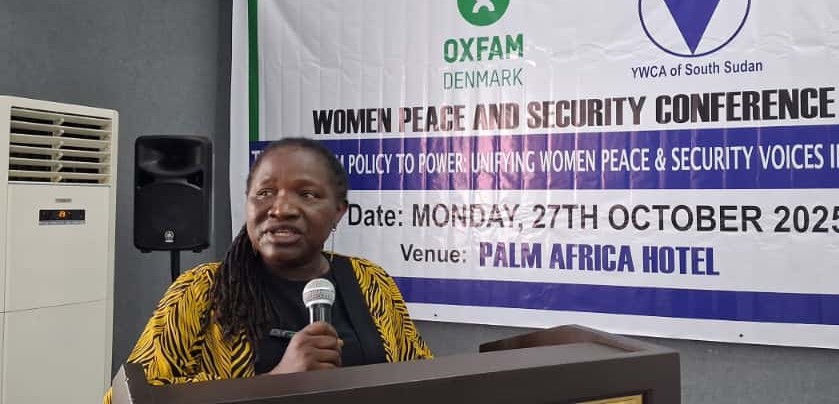
The Ministry of Gender, Child and Social Welfare has urged for a more holistic and practical approach to women’s empowerment, one that goes beyond policy statements and symbolic representation during the opening of the Women, Peace, and Security (WPS) Conference in Juba on Monday.
Speaking on behalf of the government, Joyce Ayoub, Program Assistant at the National Ministry of Gender, called for a deeper reflection on the real meaning of empowerment, noting that visibility alone does not guarantee equality.
“We have women in uniform and women in leadership, but what else are we aiming to achieve?” Ayoub asked.
“We must now move from policy to empowerment. Are women participating in all levels of government institutions? Are they given the recognition and authority their positions deserve?”
Ayoub emphasized that empowerment must be multidimensional, addressing financial, educational, and political barriers that continue to limit women’s participation and influence.
“If a woman is not empowered financially or politically, she may not have the potential to influence change. We cannot achieve equality if we are not standing in the same shoes,” she said.
She also appealed to women-led organizations, the United Nations, and development partners to continue supporting empowerment initiatives across South Sudan, saying collaboration remains key to achieving lasting gender equality.
The conference, organized by the Young Women’s Christian Association (YWCA) South Sudan in partnership with Oxfam and the Ministry of Gender, provided a platform for stakeholders to assess progress and renew commitments toward inclusive peace and development.
YWCA Executive Director Modi Mbaraza said the Women, Peace, and Security agenda remains a cornerstone of women’s participation in South Sudan’s peace process but warned that policy commitments must translate into real influence.
“We talk about the 35% affirmative action, which is a positive move for women’s participation in decision-making,” she noted.
“But are we really there? Have we achieved what we set out to achieve after South Sudan ratified these commitments?”
Mbaraza challenged participants to critically reflect on women’s role in national development and called for stronger coordination among civil society, government, and partners.
“We need to see tangible results of what we are achieving as women in South Sudan. If we have not achieved enough, then we must pull up our socks and move forward,” she added.
Also speaking at the event, Sharon Mairyunu, Gender and Protection Coordinator at Oxfam South Sudan, reaffirmed Oxfam’s continued support for the WPS agenda and urged for bold conversations ahead of the 2026 elections.
“This is a moment for us to be brutally honest with each other,” Mairyunu said.
“How are we going to influence policy and ensure women freely participate in the upcoming elections and peace processes?”
She warned that gender-based violence, including online harassment, continues to hinder women’s participation in leadership and peacebuilding.
“As long as we tolerate gender-based violence, it will be too difficult to achieve the Women, Peace, and Security goals,” she cautioned. “We must prevent and respond to all forms of violence if we want women’s participation to be meaningful.”
Mairyunu concluded by reaffirming Oxfam’s partnership with the government and women’s rights organizations, expressing hope for greater progress when the next WPS review takes place.
The conference also marked 25 years since the adoption of UN Security Council Resolution 1325, a landmark international framework that recognizes women as key actors in peacebuilding, conflict prevention, and post-conflict recovery.

